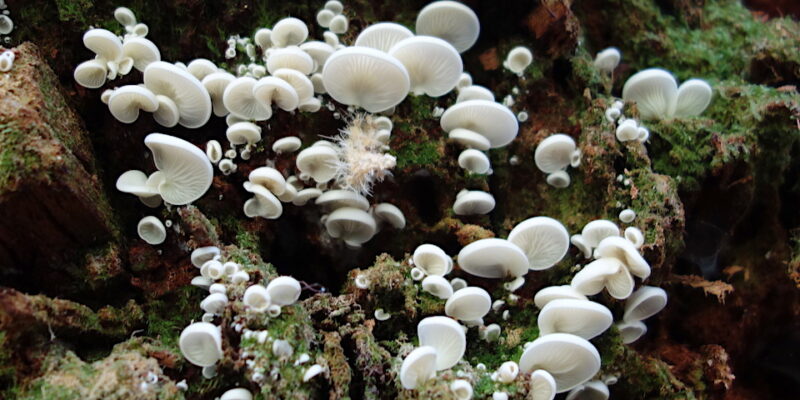Many people are familiar with the sight of mushrooms in their yard or garden. Their first thought is to get rid of these fungi.
They don’t realize that mushrooms are a sign of healthy ground and they are beneficial for the home garden.
These tireless gardeners may not be producers themselves, but they perform a role that is just as important.
Fungi convert organic matter, such as dead leaves or wood chips, into compounds that plants can use.
Decomposers, such as mushrooms, would not be able to break down complex organic material and fertilize our soil. Without mushrooms, the earth would be a barren wasteland.
In an ecosystem, mushrooms and other fungi are primary decomposers. They help break down dead organisms or those that have decayed before secondary decomposers, such as insects, can complete the process.
The fruiting body of the mushroom, which is the part most people recognize, is only a tiny portion of an underground network of microscopic roots known as hyphae.
The hyphae spread out into the soil and break down biomass to extract nutrients, making it easier to access nutrients for plants.
Find out what mushrooms do and how they benefit soil health.
What Are Mushrooms?
After a few rainy days, you step out to enjoy the sunshine. However, your yard has suddenly become overrun with mushrooms.
What you are actually seeing is the newly sprouted fruiting body of mycelium fungi that has been there all along, right under your foot.
The fungi will usually stay underground, working tirelessly to degrade any organic material they can.
The mycelium, when the conditions are just right, will release its fruiting bodies, or mushrooms, to the surface of the earth in order to announce their presence and spread out their spores.
The spores can travel thousands of miles on the wind. They will eventually settle in distant locations to colonize and break down organic matter.
To sprout, mushrooms need to have a combination that includes high levels of shade, cloudy weather, and high levels of organic material in the soil.
If all three conditions are met, you will experience a mushroom explosion in your backyard and discover how many different types of fungi exist in your soil.
What Do Mushrooms Do?
As soon as fungi spores settle in a particular area, their hyphae begin to spread in search of organic matter that has decayed.
Hyphae, unlike other bacteria that can only decompose the top layer of a substance, can also penetrate deeper into harder materials such as wood.
The fungi start excreting enzymes which begin the decomposition process, breaking down organic material into its constituent compounds.
In fact, only certain types of mushrooms can degrade lignin – the super-tough substance protecting the cell walls of trees.
If these fungi were not present, dead wood and other materials that are difficult to decompose would remain on the surface of our earth forever.
Mushrooms have another function that is equally important but less well-known. Mycorrhiza is a symbiotic relationship between fungi and plants in which mycelium from the fungi intertwines itself with the roots of nearby plants.
A fungus can fuel its growth by colonizing plant tissue and gaining direct and constant access to the carbohydrates produced by plants, such as glucose and sucrose.
The mycorrhizal fungal mycelium provides plants with nutrients such as iron, phosphate, and other ions.
Over 95% of plants are believed to be involved in some form of mycorrhizal association. Some species even depend on it for survival.
Why Are Decomposers Such As Mushrooms Considered Heterotrophs?
Some people only think of humans and animals when they consider heterotrophs. They forget that consumption can still occur even if it is not visible.
Heterotrophs are organisms that cannot produce their own food and must instead consume animal or plant matter to obtain the nutrition they require.
Heterotrophs are animals, bacteria, and parasitic plants, as well as fungi. As we have seen, mushrooms are unable to produce their own food, so they absorb nutrients from organic matter that they break down.
Mushrooms and other fungi, unlike plants that photosynthesize sugars to use as energy, must obtain their nutrition by consuming the host organism or through a symbiotic relationship with another organism.
They do not produce these compounds, even though they liberate nutrients from the decaying material they consume and make them available to other organisms. Heterotrophs are those that consume but do not produce.
How Can Mushrooms Benefit Our Backyards And Gardens?
Don’t panic if you find mushrooms in your garden. A healthy garden is marked by the presence of mushrooms. They only grow in soils that are rich in organic material, so seeing mushrooms is a sign of fertile soil.
If you are a gardener, you will benefit from this as you need fertile soil to produce a good harvest.
Mushrooms are also a sign of a healthy and strong mycelium, which is at work breaking down organic matter to provide nutrients for your plants.
The best part is that whatever you decide to plant, it will be a part of the mycorrhizal system and benefit from constant exchanges of nutrients with mycelium surrounding it.
Next time you notice a mushroom growing in your garden or lawn, be thankful. The fungi in your soil are not producers, but they still work as hard as plants to survive on your land.
The worms work tirelessly to decompose dead and dying organic matter, returning nutrients to the earth. They also form relationships with your plants to help feed and nourish their growth.
You can’t thank just your tomato plant or sweet corn for the juicy, ripe tomato or corn you eat from your garden. The mushrooms worked as hard to make sure you could enjoy your home-grown meal.













Comments